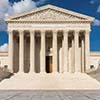Trial Court Rules LAUSD Certificated Teacher Evaluations Must Consider Student Progress Toward Meeting Standards

June 2012
Number 33
A Los Angeles County Superior Court has determined that the Los Angeles Unified School District's (LAUSD) certificated evaluation process failed to comply with state law that requires teacher performance evaluations to be based, in part, on student progress toward meeting state and district achievement standards.
In Jane Doe v. Deasy (June 12, 2012, No. BS134604), a group of California school children and their parents alleged that LAUSD's evaluation process violated the evaluation procedures set forth in Education Code sections 44660 et seq. ("Stull Act"). The Stull Act requires that the governing board of each school district establish standards of expected student achievement at each grade level in each area of study. It also requires that the governing board of each school district evaluate and assess the performance of certificated employees (both teachers and administrators) as it reasonably relates to the progress of students toward district-adopted standards.
The court held that the Stull Act specifically requires that school districts: (1) establish standards of student progress; and (2) evaluate certificated teachers and designated administrators as their performance "reasonably relates" to student progress. The court first considered the question of who is required to be evaluated and then what is required in an evaluation that considers student achievement. The court found that principals, assistant principals and teachers can be evaluated based on the progress of students in their schools. The court also determined that California Standards Tests (CSTs) can be used to measure performance based on student progress over time.
Although student progress toward standards must be considered when evaluating teachers and site administrators, the court ruled that LAUSD has the discretion to decide whether student progress is used directly or indirectly in these evaluations. The court determined that regardless of whether the evaluation considers student progress directly or indirectly, there must be a nexus between student progress and the evaluations that involves several components: (1) the evaluator must know what the student progress is with respect to the teacher; (2) the evaluator must know how to use the student progress information; and (3) the evaluator's determination of the progress must be reflected somewhere on the evaluation form.
Because this is a trial court decision, it is not binding on other school districts and could be appealed. However, this case is important because it interprets existing law as requiring that employee evaluations affirmatively consider student progress. This ruling may serve as an impetus for many districts throughout California to consider increasing the use of student data in certificated and site administrator evaluations. Whether this ruling ultimately requires all California school districts to use student data in their evaluation systems or prompts legislation that compels this requirement remains to be seen.
This case also presents many intriguing negotiations issues that will need to be addressed if your district elects to move toward increased use of student assessment data in evaluations. Our firm is involved at the bargaining table with these issues, and we would be happy to share our insights and experiences with you.
If you have any questions regarding employee evaluations, this decision, how it impacts the evaluation process of certificated personnel in your school district, or the negotiations issues that flow from this decision, please feel free to contact one of our eight offices located statewide. You can also visit our website or follow Lozano Smith on Facebook.
Number 33
A Los Angeles County Superior Court has determined that the Los Angeles Unified School District's (LAUSD) certificated evaluation process failed to comply with state law that requires teacher performance evaluations to be based, in part, on student progress toward meeting state and district achievement standards.
In Jane Doe v. Deasy (June 12, 2012, No. BS134604), a group of California school children and their parents alleged that LAUSD's evaluation process violated the evaluation procedures set forth in Education Code sections 44660 et seq. ("Stull Act"). The Stull Act requires that the governing board of each school district establish standards of expected student achievement at each grade level in each area of study. It also requires that the governing board of each school district evaluate and assess the performance of certificated employees (both teachers and administrators) as it reasonably relates to the progress of students toward district-adopted standards.
The court held that the Stull Act specifically requires that school districts: (1) establish standards of student progress; and (2) evaluate certificated teachers and designated administrators as their performance "reasonably relates" to student progress. The court first considered the question of who is required to be evaluated and then what is required in an evaluation that considers student achievement. The court found that principals, assistant principals and teachers can be evaluated based on the progress of students in their schools. The court also determined that California Standards Tests (CSTs) can be used to measure performance based on student progress over time.
Although student progress toward standards must be considered when evaluating teachers and site administrators, the court ruled that LAUSD has the discretion to decide whether student progress is used directly or indirectly in these evaluations. The court determined that regardless of whether the evaluation considers student progress directly or indirectly, there must be a nexus between student progress and the evaluations that involves several components: (1) the evaluator must know what the student progress is with respect to the teacher; (2) the evaluator must know how to use the student progress information; and (3) the evaluator's determination of the progress must be reflected somewhere on the evaluation form.
Because this is a trial court decision, it is not binding on other school districts and could be appealed. However, this case is important because it interprets existing law as requiring that employee evaluations affirmatively consider student progress. This ruling may serve as an impetus for many districts throughout California to consider increasing the use of student data in certificated and site administrator evaluations. Whether this ruling ultimately requires all California school districts to use student data in their evaluation systems or prompts legislation that compels this requirement remains to be seen.
This case also presents many intriguing negotiations issues that will need to be addressed if your district elects to move toward increased use of student assessment data in evaluations. Our firm is involved at the bargaining table with these issues, and we would be happy to share our insights and experiences with you.
If you have any questions regarding employee evaluations, this decision, how it impacts the evaluation process of certificated personnel in your school district, or the negotiations issues that flow from this decision, please feel free to contact one of our eight offices located statewide. You can also visit our website or follow Lozano Smith on Facebook.
As the information contained herein is necessarily general, its application to a particular set of facts and circumstances may vary. For this reason, this News Brief does not constitute legal advice. We recommend that you consult with your counsel prior to acting on the information contained herein.






